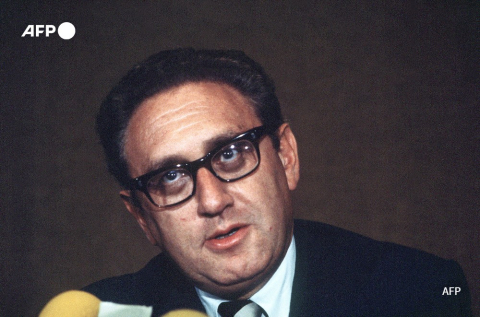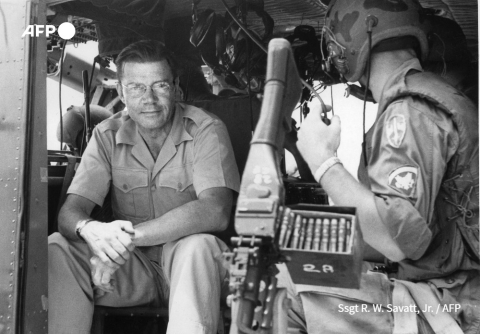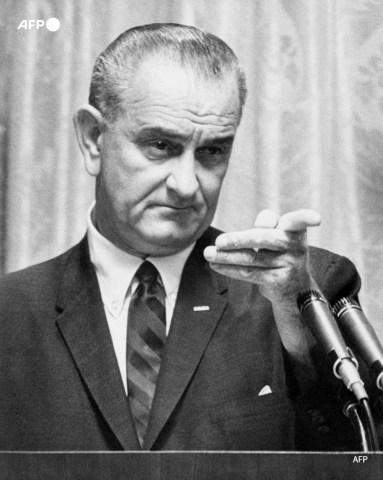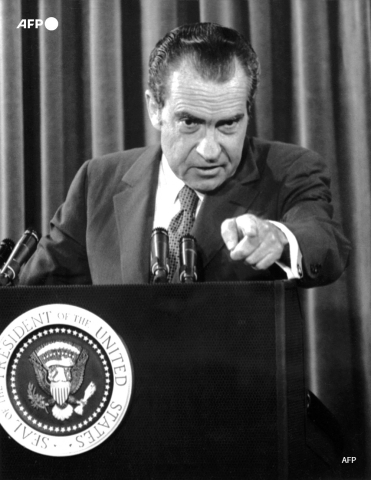US leaders during the war in Vietnam

Here are four US leaders who played leading roles during the country's war in Vietnam.
- Henry Kissinger -
Kissinger was a Jewish refugee from Nazi Germany who became a top White House adviser and master of US realpolitik.
As president Richard Nixon's assistant for national security affairs, Kissinger was Washington's chief negotiator at the Paris peace talks.
Kissinger won the Nobel Peace Prize in 1973 along with his North Vietnamese counterpart Le Duc Tho, who refused the honour.
Kissinger began his career teaching government at Harvard University; he was Nixon's assistant for national security affairs from 1969 to 1975 and secretary of state from 1973 to 1977.
Born in the Bavarian town of Fuerth in 1923, his family fled Germany in 1938 and resettled in New York.
With remarkable determination and intelligence, Kissinger earned a doctorate from Harvard in 1954.
Despite quickly realising that a US victory over Vietnamese communists would be impossible, Kissinger believed a US withdrawal would be impossible as well -- although that is what eventually happened.
In April 2000 Kissinger told Newsweek magazine that US policymakers had failed to draw the right lessons from Vietnam.
He said they should not shy from the "unapologetic use of power as a last resort" when defending vital US interests.
In late 2014, however, Kissinger told the German weekly Der Spiegel: "You become a superpower by being strong but also by being wise and by being far-sighted. But no state is strong or wise enough to create a world order alone."
He added that when writing a book entitled "Ending the Vietnam War", one of the points he sought to make was that "you should not think that you can shape history only by your will."

- Robert McNamara -
As US secretary of defense, McNamara was one of the main architects of the war in Vietnam, especially the escalation of US war efforts from 1961 to 1968.
A trained economist, he came to regret his role in the war, as he said in his 1995 memoirs.
"We were wrong, terribly wrong. We owe it to future generations to explain why," he wrote.
"We do not have the God-given right to shape every nation in our own image or as we choose," McNamara added.
He was first defense secretary to PresidentJohn F. Kennedy. On his watch the US military role in Vietnam escalated from a few hundred US soldiers advising South Vietnam's military to some 17,000 by 1964.
"I don't object to its being called McNamara's war," he wrote of Vietnam at the time. "I think it is a very important war and I am pleased to be identified with it and do whatever I can to win it."
Around the time McNamara stepped down in 1968, the number of US soldiers sent to fight in Vietnam had risen to 535,000.
But after years of clashes with President Lyndon Johnson and top military brass, and facing a growing anti-war movement at home, McNamara resigned.
In his memoirs, he acknowledged that Washington had not understood the goals of Ho Chi Minh and the North Vietnamese (DRV) government, among others.
"We misjudged the geopolitical intentions of the Vietcong, the DRV, China, and the USSR, and exaggerated the dangers to the US of their actions," McNamara said.
After leaving the Pentagon, McNamara went on to head the World Bank. He died on July 6, 2009 at the age of 93.
- Graham Martin -
Martin was the last US ambassador to South Vietnam and has been blamed for refusing to see how dire the situation was in April 1975.
Due to a chaotic, last-minute evacuation of US and priority Vietnamese personnel, thousands of Vietnamese who worked for the United States and hundreds of classified documents were left behind.
Martin took up the post in July 1973, six months after the Paris Peace Accord was signed, and was one of the last to leave Saigon on April 29, 1975.
A fiercely anti-communist former colonel, he had been US ambassador to Italy and Thailand, and reportedly won funding for neo-fascist intelligence chief Vito Miceli who used it to undermine the Italian government.
Former CIA senior analyst Frank Snepp wrote in his scathing book "Decent Interval" that Martin ignored reports in 1975 that North Vietnam wanted a complete victory and thought he could negotiate a peaceful end to the war.
Snepp described Martin as "a Cold Warrior of the old stripe" who, after losing a son in Vietnam, "wasn't going to lose Saigon to the Communists."
"He refused to plan in earnest for an accelerated evacuation," Snepp said.
Martin is nonetheless credited with delaying his own helicopter flight from the embassy to the USS Blue Ridge so that as many Vietnamese as possible could escape.
He died in March 1990 at the age of 77.

- Lyndon Baines Johnson -
Johnson "inherited" the Vietnam war from John F. Kennedy. LBJ, as he was widely known, became the 36th US president on November 22, 1963, after Kennedy was shot dead in Dallas, Texas.
When a US warship reported being attacked in August 1964, Johnson ordered air strikes against North Vietnam and US lawmakers approved a resolution that allowed him to boost the military presence in South Vietnam.
In November he won reelection with an historic 61 percent of the popular vote.
Johnson substantially raised the number of troops in Vietnam in 1965 and committed the United States to major combat operations there.
But he was wary of Pentagon officials and criticized for micro-managing US bombing campaigns, which failed to ease pressure on South Vietnam.
"By keeping a lid on all the designated targets, I knew I could keep the control of the war in my own hands," he was quoted as saying by biographer and former assistant Doris Kearns.
Johnson halted US bombing of North Vietnam in November 1968.
With opposition to the war on the rise, Johnson had shocked the nation eight months earlier by announcing that he would not run for re-election.
By then there were more than 500,000 US troops in Vietnam and his approval rating had fallen to 36 percent.
At anti-war rallies a common chant was: "Hey, hey, LBJ, how many kids did you kill today?"
Peace talks were in the offing when he left office in January 1969. Johnson died of a heart attack at his Texas ranch on January 22, 1973, a day after learning that peace was at hand in Vietnam. He was 64.

- Richard Nixon -
The 37th US president was determined to end the war in Vietnam. With Henry Kissinger he launched the Paris peace talks, but he also resumed US bombing of North Vietnam in May 1972 and approved an invasion of Cambodia in 1970 to try to cut the Ho Chi Minh supply trail.
After the Paris Peace Accord was signed in January 1973, Nixon withdrew US troops from Vietnam and ended the draft.
He promised to continue supporting the South Vietnamese government in its fight against troops from the North but the Watergate scandal forced him to resign in August 1974.
By then he had reestablished diplomatic relations with China, a key backer of North Vietnam.
Nixon died on April 22, 1994 at the age of 81.
